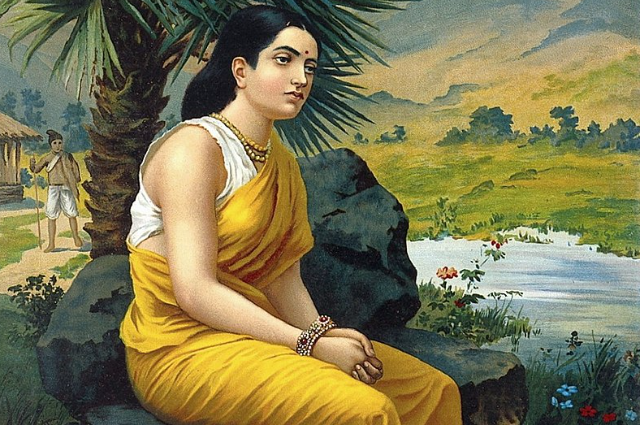
Sita in the Ramayana isn't just a character in a story. She is someone who lived through a lot of pain, silence, loyalty, strength, and choices that were never really hers. Whenever we talk about the Ramayana, most of the spotlight goes to Ramhis journey, his war, his dharma. But if we look closely, Sita's journey is equally important, and in many ways, even more emotional and complex.
Sita was born on Earth. That one detail already sets her apart from everyone else. She didn't come into the world in the usual way. She was found in a furrow by King Janak while he was ploughing the field, and in a way that connects her with nature, purity, and something divine. But that divinity didn't protect her from human struggles. Instead, her life was full of constant tests. Not of her strength, but of her patience.
From the moment she married Ram, her life changed. She chose to go into exile with him. She could have stayed back in the palace. She didn't have to sleep on the ground or walk barefoot in the forest. But she went, not just out of love, but because she believed in sharing everything equally good times and bad.
Sita's kidnapping by Ravan is often seen as a turning point in the Ramayana, and it is, but not just because Ram goes to war. It's a turning point for her as a person. She was taken without her consent. Locked in a garden. Threatened. And yet, she never gave in. She waited. She held on. That waiting is often ignored, but imagine being alone in a strange place with no one to talk to except the trees and birds. That takes another level of mental strength.
When Hanuman finds her and gives her the ring, she doesn't agree to go back with him. Not because she's proud, but because she knows this is not about escaping. She wants Ram to come and win her back. Not because she needs to be rescued, but because she knows this whole war isn't just about her. It's about justice. About showing the world that women are not weak. That her respect is worth a war.
But the part that changes everything is what happens after she returns. The Agni Pariksha. That fire test. Sita walks through flames to prove her purity. And here's where the tragedy begins. She was never unfaithful. She had no reason to be tested. But society demanded proof. And she gave it. That's the saddest thing. Her love was pure, but she had to prove it to others.
Even after the war, even after everything was done, when she was pregnant, Ram asked her to leave. Again, because of what people might say. He chooses his duty as a king over his duty as a husband. And Sita doesn't beg or plead. She leaves quietly and gives birth in the forest. She raises her sons alone, teaches them values, stories, archery, everything. She becomes both mother and father.
When the twins, Luv and Kush, grow up and come back to Ayodhya, and Ram realises the truth, he wants Sita to come back too. But by then, Sita is done. She's tired. She's been tested enough. Instead of going back, she returns to the earthly place where she came from. That's her final act of choice. Her final stand. She refuses to live in a world that never trusted her.
So when we talk about Sita, we shouldn't just see her as someone who followed her husband. She was not a background character. She had her pain, strength, and beliefs. She suffered a lot but never lost her dignity. She was soft, but not weak. She forgave, but never forgot.
Sita also represents every woman who has had to prove herself again and again. Every woman who had to give up things just to be accepted. Every woman who was told to stay quiet because it's "her duty." She shows us what it means to stand tall even when the world doubts you.
In many parts of India, Sita is still worshipped, but in most stories and even TV shows, her silence is shown more than her strength. The truth is, her silence was not helplessness. It was a decision. She chose peace over shouting. She chose dignity over argument. But that doesn't mean she didn't feel anger, pain, or disappointment. She just carried it differently.
Also, Sita's story is not just about marriage or being a queen. It's about self-respect. About setting limits. About understanding when to walk away. When she refused to go back to ram in the end, it wasn't an act of revenge. It was closure. A full stop.
Through her, the Ramayana shows how society treats women who don't fit the mold. She didn't fight with weapons, but that doesn't mean she didn't fight. She fought every single day with her choices, her silence, her love, and her patience.
And even though the world often calls her pure, divine, and ideal, I think what makes her special is not those labels. It's that she was human. Deeply human. She cried, she hoped, she waited, she let go. And still, she stayed true to who she was.
Today, when we read or watch the Ramayana, we need to pay attention to Sita not just as Ram's wife, but as her person. Her journey wasn't about a palace or a forest or a kingdom. It was about something deeper. About what it means to be tested constantly and still hold your head high. Sita may have disappeared into the earth in the end, but her story didn't. It stayed. It speaks softly, But it stays.
. . .
